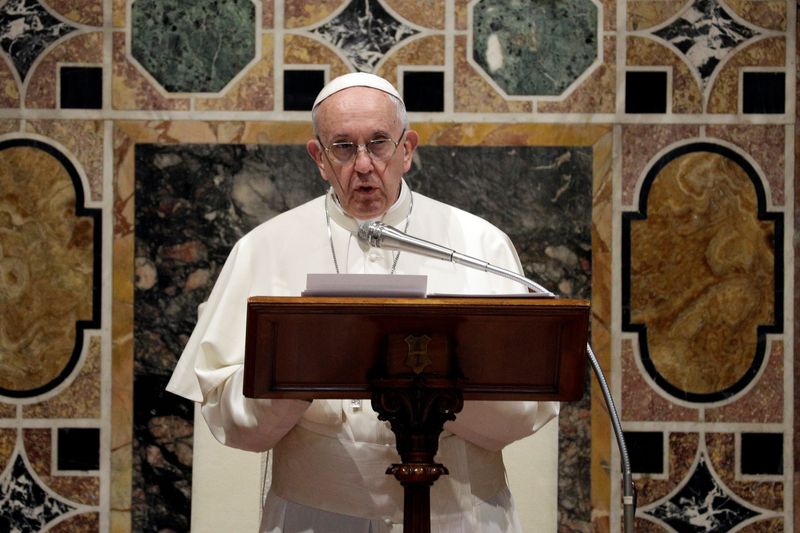By Philip Pullella
VATICAN CITY (Reuters) -Pope Francis condemned Iran's execution of protesters for the first time on Monday in his traditional New Year's address to diplomats, and said the war in Ukraine was "a crime against God and humanity".
The pontiff made his remarks in a speech to diplomats accredited to the Vatican, his overview at the start of the new year which has come to be known informally as his "state of the world" address.
His eight-page speech in Italian, read to representatives of most of the 183 countries accredited to the Vatican, ran the gamut of all the world's conflict areas, including those in Africa, the Middle East and Asia.
He repeated his condemnation of abortion, appealing "particularly to those having political responsibilities, to strive to safeguard the rights of those who are weakest", and he again warned of threat of a nuclear conflict.
However, the main novelty of the speech in the Vatican's Hall of Benedictions was his breaking of silence on the nationwide unrest in Iran since the death last September of 22-year-old Kurdish Iranian woman Mahsa Amini in police custody.
"The right to life is also threatened in those places where the death penalty continues to be imposed, as is the case in these days in Iran, following the recent demonstrations demanding greater respect for the dignity of women," he said.
Four protesters have been executed in connection with the wave of popular protests in the Islamic Republic.
"The death penalty cannot be employed for a purported state justice, since it does not constitute a deterrent nor render justice to victims, but only fuels the thirst for vengeance," Francis said.
He then repeated an appeal for an end to capital punishment worldwide, saying it is "always inadmissible since it attacks the inviolability and the dignity of the person".
Francis said many countries were paying lip service to commitments they had made to respect human rights and he called for respect for women, saying they were still widely being deemed second-glass citizens, subjected to violence and abuse.
"It is unacceptable that part of a people should be excluded from education, as is happening to Afghan women," he said.
Francis spoke of the "war in Ukraine, with its wake of death and destruction, with its attacks on civil infrastructures that cause lives to be lost not only from gunfire and acts of violence, but also from hunger and freezing cold".
He then immediately quoted from a Vatican constitution, saying "every act of war directed to the indiscriminate destruction of whole cities or vast areas with their inhabitants is a crime against God and humanity which merits firm and unequivocal condemnation".

Referring to the Cuban Missile Crisis in 1962, he said: "Sadly, today too, the nuclear threat is raised, and the world once more feels fear and anguish."
The pope repeated his appeal for a total ban on nuclear weapons, saying even their possession for reasons of deterrence is "immoral".